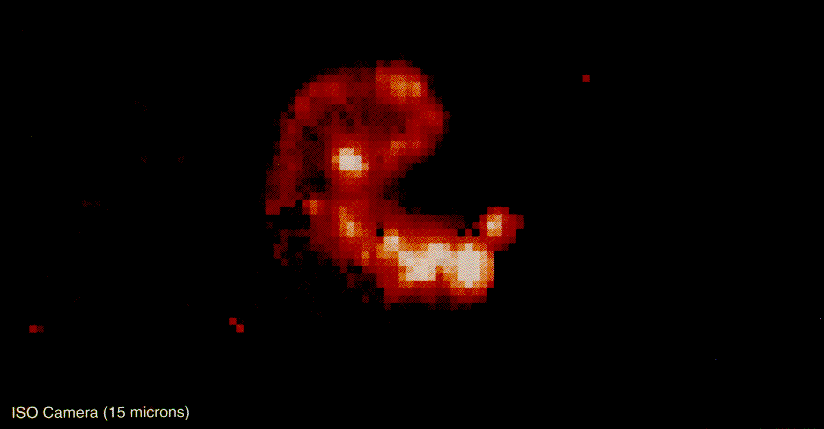Antennae Galaxies: NGC 4038/39

Credit: ESA/ISO, CEA Saclay and ISOCAM Consortium
See also the NGC 4038/9 image gallery
STARBURSTS IN COLLIDING GALAXIES
Contrasting regions of intensive star formation appear in infrared light from a pair of galaxies in collision, observed by the European Space Agency's new Infrared Space Observatory, ISO. The Camera in ISO (also called ISOCAM) obtained this image at a wavelength of 15 microns, where the Earth's atmosphere makes cosmic observations very difficult -- hence the need for Europe's space telescope dedicated to infrared astronomy.
The colliding galaxies lie 60 million light-years away in the constellation of Corvus (the Crow). They are catalogued as NGC 4038 and 4039 but astronomers also know them as the Antennae galaxies. Although the galaxies look similar by visible light, ISO sees important differences between them. Observations by the Camera at many other infrared wavelengths have aided the interpretation.
Clouds of gas and dust in the two galaxies have crashed together and provoked starmaking events called starbursts. In the lower galaxy (NGC 4039) an extended bright region, with a hotspot at the right-hand side, marks the overlap of the disks of the two spiral galaxies. Here the collision is fiercest and star formation most rapid.
An isolated bright spot in the middle of the upper galaxy (NGC 4038) is a large ring of intense starmaking around the central nucleus. This feature is absent in the other galaxy.
Astronomers using ISO expect the new space observatory to clarify the role of collisions in the evolution of galaxies. Relatively recent collisions like that in the Antennae will be compared with very distant events corresponding with the early phase of cosmic history.
Note about wavelengths:
A micron is a millionth of a metre. Visible light has wavelengths 0.4 to 0.7 microns. ISO's four instruments span the infrared range from 2.4 microns up to 240 microns, or about a quarter of a millimetre.
 Return to the press release main page
Return to the press release main page
Paris, 14 February 1996
ESA Public Information & Media Offices
ESA - Paris, F, Tel. +33 1-53697111
ESTEC - Noordwijk, NL, Tel: +31 715-653006
ESOC - Darmstadt, D, Tel: +49 6151-902696
ESRIN - Frascati, I, Tel: +39 6-94180260
This Picture may be reproduced without fee, on the following conditions:
- it may not be used to state or imply the endorsement by ESA or any ESA employee of a commercial product, process or service, or used in any other manner that might mislead; if recognisable persons appear in this picture, use for commecial purposes may infringe their rights. If this picture is to be used in advertising or any commercial promotion, layout and copy should therefore be submitted to ESA beforehand for approval;
- the credit line should read: photo ESA.





 Return to the press release main page
Return to the press release main page